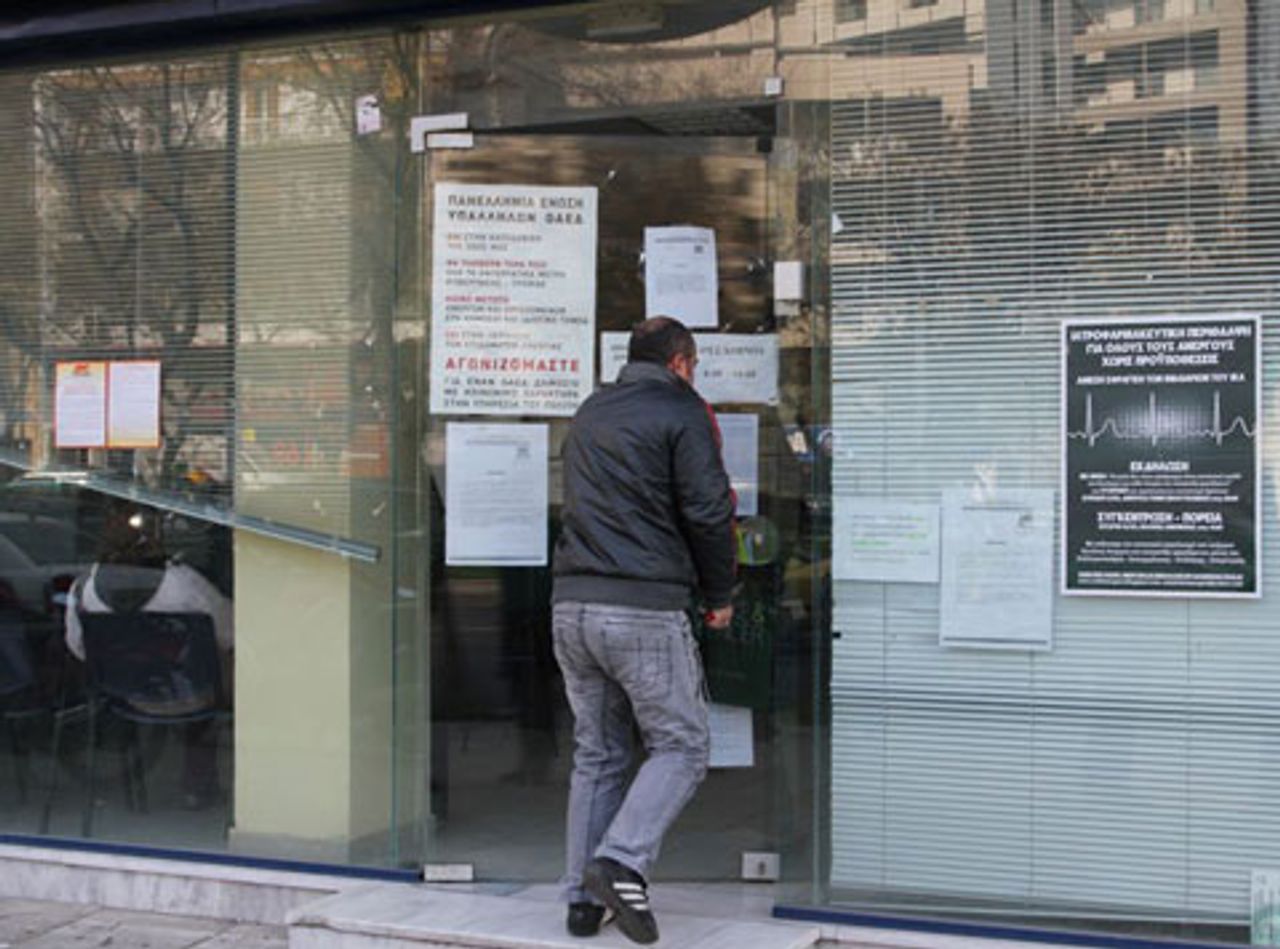A World Socialist Web Site reporting team spoke to a number of workers and young people in Athens on Friday and Saturday, on the eve of the June 17 election.
Fotini spoke to the WSWS in the Athens suburb of Aigaleo. From the island of Crete, she is currently studying philology at a university in Athens. She also works in an after-school education institute.
 Fotini
FotiniAsked about the June 17 election, Fotini told us, “We are in a difficult situation at the moment and most people don’t know who to vote for. Even if you decide to vote for a party it’s not because it’s a party who you think represents you. There’s no party in Greece any more that represents people. People are all disillusioned in parties.
“Since the memorandum [the austerity measures agreed with the European Union, European Central Bank and International Monetary Fund] was implemented, people are in great economic difficulty and the situation is getting worse. There are problems in Athens, but there are many problems as well in the countryside. I have friends in Macedonia and they can’t get any work. The difference is in the city you have problems with dealing with everyday life.”
Asked what she thought about the threat of some leading EU and international banking representatives to expel Greece from the euro zone, Fotini replied, “I don’t think Greece will leave the EU because for other countries it’s against their own interests, but certainly a lot of people are afraid and want Greece to stay in the EU. Most people want to stay in the euro, but the problem is the memorandum.”
Fotini described the cuts in education and health care that have ravaged the Greek population. At her university in Athens, she said, “Yesterday there were exams and they couldn’t even give the students paper, as they had run out. They used to have three hours for exams and now these have been cut to two. The philosophy department now cannot pay its expenses and they are thinking of asking all the students to make a monthly donation to support the school.” She added, “I think the school will close and there will be strikes there soon.”
On the health cuts, Fotini said, “The biggest problem is with the pharmacies. We have to pay the whole amount of money. Before we only paid a part and the other part was paid by public insurance. Now we pay it all and can give a receipt to the insurance company, but we don’t know if we’ll get it back. It’s the same with the hospitals. The biggest problem is for people with serious illnesses like cancer. The hospitals don’t have enough medicines or equipment.”
Fotini explained that “it is older people with families who have the greatest problems as they have to oversee the house.” She told us that due to a new property tax, her family has to pay an extra €400 a year. The biggest problem she said was that wages were going down and prices going up.
“A lot of people now support SYRIZA [the Coalition of the Radical Left], but I don’t think that [SYRIZA leader Alexis] Tsipras understands the interests of the troika. Either he will be brave and say we will leave the EU, or he will just follow the interests of foreign capital”.
Fotini said she thought that in the long run Greece could develop an economic growth plan based on the development of its agricultural resources. Asked how Greece could develop such a programme in economic isolation, she argued, “Greece is really rich in resources, so I think it is possible to have a programme of economic autonomy”.
 A man going into an unemployment office in the Athens district of Syggrou Fix
A man going into an unemployment office in the Athens district of Syggrou FixChristos Kontomitros is a taxi driver who spoke to the WSWS at a taxi rank near the Acropolis. He related how the crisis had affected him and his family: “My wages have gone down by 30 to 40 percent, whilst prices have gone up. This is the case even though taxi fares have gone up.
“My children both had jobs and now they are unemployed. My wife works in the private sector and hasn’t had a full wage for one year, only receiving part-time wages.”
Christos paid €200,000 for a taxi license, as it allows him to work in the main Athens tourist spots. He told us that if he sold it now, it would only fetch €80,000. He had wanted to leave the value of the taxi license to his children.
He was involved in the protests by thousands of taxi drivers last year. The drivers were protesting the deregulation of 135 protected professions, including the taxi trade.
Christos said he knew many drivers that had to give up the taxi business, as they could no longer make a living.
Asked about the June 17 election, Christos said that he and most taxi drivers had usually voted for New Democracy (ND), but this time he didn’t plan to vote for any party due to his lack of faith in them. “If ND wins, they will just follow the same policies, which is to do what [German Chancellor Angela] Merkel says and put the cuts through, which is no solution.”
“I feel most sorry for my daughters who have studied all their lives and will now not get work.”
Lefteris is a street cleaner who has never earned more than €700-800 ($890-1,016) a month. He is trying to hold down two jobs in order to survive. He said the “biggest problem now is that the pensioners always had more money in the pensions than the young generation had, so they could rely on the pension money. This has now all changed as the pensions have been cut.”
The WSWS also spoke to a number of people at the KTEL Kifissia bus station in Athens. A number of people were begging in the station, including many young children.
Sila, 22, is a nursing student who goes to school in Sparta. She also works part-time in a pharmacy. She said, “I wouldn’t vote for a big party. I won’t vote for SYRIZA as I don’t believe them”.
She said she had not yet participated in protests in the streets, but explained that “in the pharmacies there have been a number of work-to-rule strikes” as the crisis in health care has worsened.
Anna Papadionysiou, 26 and unemployed, is from the third largest city in Greece, Patras.
She graduated from college, but has been unemployed for two years. Anna occasionally teaches English in order to supplement her small social benefits income, but only gets around five or six euros an hour. She is able to survive because she lives with her parents.
Anna had been to Athens for a job interview. She said she was “of the left”, but had not yet decided who to vote for, adding, “I think the economic situation in Europe is dead in economic terms. I think no matter who I vote for, things will not change. I think all the decisions have already been made.”
She had voted SYRIZA and “for the left” in previous years, she explained. Asked her opinion of SYRIZA, she commented, “I think it is the only party that could do something, if anything could be done. I think it is the only party that could be helpful for the people here.”
She said her brother was 30 years old and had been unemployed for two years. He had now come to Athens in an attempt to find work. In total, her family had lost €600 a month in income.
Anna said she had participated in a number of protests against austerity last year, but not this year, “as I have lost hope”.
She said, “I believe in strikes and I think this is the only way to protest, but I think that strikes should not be organised by parties, but by the people generally.”
Anna concluded, “Two years ago I was in my own world, but now you find the crisis everywhere. Everybody you know is suffering the consequences of the crisis. People can’t even bear to watch the news. They feel terrorised by what is being done to them.
“What future have we got? I am stuck in my apartment. I told my friends that the crisis is like having your legs cut off”.
